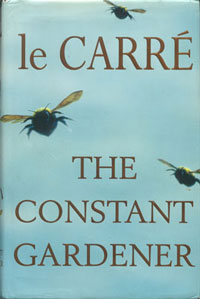The Constant Gardener
The Constant Gardener is a 2001 novel by British author John le Carré. The story revolves around Justin Quayle, a British diplomat in Kenya, whose activist wife, Tessa, is murdered. The narrative begins with Tessa's murder and follows Justin as he embarks on a personal journey to uncover the truth behind her death, which leads him into a complex web of corruption and intrigue involving multinational pharmaceutical companies exploiting Kenya's population for dangerous drug trials.
The novel is a critique of the practices of big pharma, particularly their exploitation of the developing world. Le Carré, through this gripping narrative, explores themes of love, loss, betrayal, and the moral complexities of globalization and Western imperialism. The story is not just a thriller but also a profound exploration of the human condition and the ethical dilemmas faced by individuals in the face of global injustices.
Plot Summary[edit | edit source]
The story opens with the murder of Tessa Quayle near Lake Turkana in northern Kenya. Tessa had been investigating a powerful pharmaceutical company's unethical practices, which she believed were causing the deaths of thousands of Africans. Her husband, Justin Quayle, a mild-mannered diplomat, is initially unaware of the depth of Tessa's investigation. However, her death propels him into action, and he begins retracing her steps to uncover the truth.
Justin's quest leads him across Europe and Africa, as he pieces together his wife's secret life and the reasons behind her murder. Along the way, he encounters various characters who contribute pieces to the puzzle, including Tessa's colleague, Dr. Arnold Bluhm, who was initially suspected of her murder, and Lorbeer, a German doctor working in the slums of Nairobi. As Justin delves deeper, he uncovers a conspiracy involving a new tuberculosis drug being tested on Africans without their informed consent, leading to numerous deaths.
Themes and Analysis[edit | edit source]
The Constant Gardener delves into the ethical implications of pharmaceutical companies' operations in developing countries, highlighting the disparity between the global North and South. The novel questions the morality of placing profits over people's lives and the role of Western countries in exploiting the vulnerabilities of the developing world.
The personal journey of Justin Quayle from a passive diplomat to an active seeker of justice mirrors the transformation that le Carré suggests is necessary in the face of global injustices. Tessa's character, though deceased from the beginning, is a powerful presence throughout the novel, representing the possibility of resistance and the impact of individual actions against systemic corruption.
Adaptations[edit | edit source]
The novel was adapted into a film in 2005, directed by Fernando Meirelles and starring Ralph Fiennes as Justin Quayle and Rachel Weisz as Tessa. The film received critical acclaim, particularly for its direction and Weisz's performance, which won her an Academy Award for Best Supporting Actress.
Reception[edit | edit source]
The Constant Gardener was well-received by critics and readers alike for its compelling narrative, complex characters, and its critical perspective on the pharmaceutical industry and Western involvement in Africa. It is considered one of le Carré's most important works, highlighting his ability to weave intricate stories that explore significant social and political issues.
This article is a literature-related stub. You can help WikiMD by expanding it!
Transform your life with W8MD's budget GLP1 injections from $125
W8MD offers a medical weight loss program NYC and a clinic to lose weight in Philadelphia. Our W8MD's physician supervised medical weight loss centers in NYC provides expert medical guidance, and offers telemedicine options for convenience.
Why choose W8MD?
- Comprehensive care with FDA-approved weight loss medications including:
- loss injections in NYC both generic and brand names:
- weight loss medications including Phentermine, Qsymia, Diethylpropion etc.
- Accept most insurances for visits or discounted self pay cost.
- Generic weight loss injections starting from just $125.00 for the starting dose
- In person weight loss NYC and telemedicine medical weight loss options in New York city available
- Budget GLP1 weight loss injections in NYC starting from $125.00 biweekly with insurance!
Book Your Appointment
Start your NYC weight loss journey today at our NYC medical weight loss, and Philadelphia medical weight loss Call (718)946-5500 for NY and 215 676 2334 for PA
Search WikiMD
Ad.Tired of being Overweight? Try W8MD's NYC physician weight loss.
Semaglutide (Ozempic / Wegovy and Tirzepatide (Mounjaro / Zepbound) available. Call 718 946 5500.
Advertise on WikiMD
|
WikiMD's Wellness Encyclopedia |
| Let Food Be Thy Medicine Medicine Thy Food - Hippocrates |
Translate this page: - East Asian
中文,
日本,
한국어,
South Asian
हिन्दी,
தமிழ்,
తెలుగు,
Urdu,
ಕನ್ನಡ,
Southeast Asian
Indonesian,
Vietnamese,
Thai,
မြန်မာဘာသာ,
বাংলা
European
español,
Deutsch,
français,
Greek,
português do Brasil,
polski,
română,
русский,
Nederlands,
norsk,
svenska,
suomi,
Italian
Middle Eastern & African
عربى,
Turkish,
Persian,
Hebrew,
Afrikaans,
isiZulu,
Kiswahili,
Other
Bulgarian,
Hungarian,
Czech,
Swedish,
മലയാളം,
मराठी,
ਪੰਜਾਬੀ,
ગુજરાતી,
Portuguese,
Ukrainian
Medical Disclaimer: WikiMD is not a substitute for professional medical advice. The information on WikiMD is provided as an information resource only, may be incorrect, outdated or misleading, and is not to be used or relied on for any diagnostic or treatment purposes. Please consult your health care provider before making any healthcare decisions or for guidance about a specific medical condition. WikiMD expressly disclaims responsibility, and shall have no liability, for any damages, loss, injury, or liability whatsoever suffered as a result of your reliance on the information contained in this site. By visiting this site you agree to the foregoing terms and conditions, which may from time to time be changed or supplemented by WikiMD. If you do not agree to the foregoing terms and conditions, you should not enter or use this site. See full disclaimer.
Credits:Most images are courtesy of Wikimedia commons, and templates, categories Wikipedia, licensed under CC BY SA or similar.
Contributors: Prab R. Tumpati, MD



